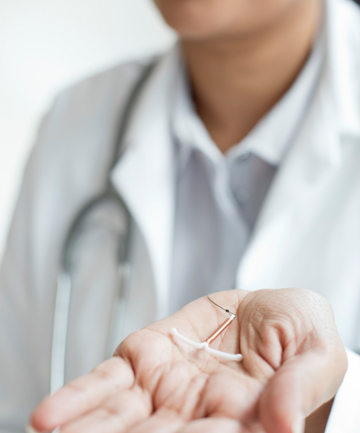Birth control does a great job of preventing pregnancy but has no involvement in preventing sexually transmitted diseases. For this reason and many more, practicing safe sex is a must to ensure you're healthy. "You also need to use a barrier method (such as condoms) to help prevent against sexually transmitted disease," says Julia Kavanagh, M.D., Internal Medicine Physician at UCHealth. If you haven't been tested, or have recently been with a new partner, consider scheduling an appointment with your OB/GYN or primary care provider.
Image via Getty
Image via Getty
"LARC, Long Acting Reversible Contraceptives, which include the IUDs and implant, are the most effective forms of reversible birth control currently available to women, but they are severely underutilized, with only 11.6 percent of women using them," says Hunter. "Although this number increased 2.4 percent from 10 years earlier, it is still staggeringly low." One of the reasons for this low number is because of provider discomfort during placement, but the majority is due to lack of understanding on the patient's part, she says. "Many patients think they have to have had a baby before to be able to get LARC, but this is not true."
Image via Getty
Image via Getty
In rare cases, some people may experience infection upon placement or long after. "One recent study did find that women with IUDs are slightly more likely to have bacterial vaginosis, or BV, but not because of the IUD," says Rebecca Levy-Gantt, MD, OB/GYN, at Premier ObGyn Napa Inc., in Napa, California. "It is likely because they are not using condoms because they are not worried about pregnancy." If infection occurs, it's best to treat the infection with the IUD in place, rather than remove it.
Image via Getty
Image via Getty
This is untrue. Most emergency contraception, or EC, can be taken within 72 hours or up to five days after unprotected sex. But the sooner you take it the better it works. "Some emergency contraceptives are sold in the United States without a prescription," says Kavanagh. "A copper T IUD also can serve as emergency contraception if placed within five days of unprotected intercourse."
Image via Getty
Image via Getty
No, you do not need to have a period every month when on the pill. In fact, according to Kavanagh, there are now contraceptive pills that are designed so that the user menstruates every three months. This is perfectly normal, healthy and does not adversely affect the user's future fertility, she adds.
Image via Getty
Image via Getty







